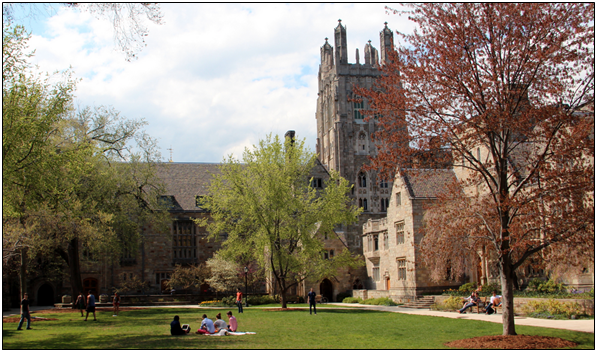By Natalia Castro
The Department of Justice took a stand against prejudice last month when the department filed a complaint against Harvard College for discriminated against Asian American students. Now, the DOJ has taken this a step further by expanding their complaint to include three other universities known for discrimination in their admissions process. By expanding the scope of their complaint, the DOJ is reaffirming their commitment to justice and equality for all.
The Wall Street Journal reported this week that the DOJ is investigating Yale, Brown, and Dartmouth colleges for holding Asian-American students to a higher standard than students of other races and use an illegal quota to cap the number of admitted Asian American students.
The Asian American Coalition for Education continued in a Sept. 2018, “Compelling evidence indicates that Yale University and many other selective colleges in the U.S. fail to comply with [antidiscrimination] laws. On the contrary, they have applied de facto racial quotas, racial stereotypes and higher admissions standards to discriminate against Asian American applicants. After extracurricular activities and other factors are adjusted, an Asian-American applicant has to score on average 140, 270 and 450 points higher than a white student, a Hispanic student and a black student on the SAT, respectively, in order to enjoy the same chances of admissions. Such blatant and widespread discrimination against Asian American children needs to be stopped.”
According to the Wall Street Journal report, Yale has “unequivocally” denied any discrimination in admissions proceedings.
The Department of Justice and Asian American groups blame this discrimination on affirmative action policies, which are meant to provide historically marginalized minority groups with greater access to higher education. Unfortunately, Asian Americans are not viewed as marginalized enough to receive equal opportunities.
When the DOJ began investigating Harvard University in August, Attorney General Jeff Sessions noted, “No American should be denied admission to school because of their race. As a recipient of taxpayer dollars, Harvard has a responsibility to conduct its admissions policy without racial discrimination by using meaningful admissions criteria that meet lawful requirements. The Department of Justice has the responsibility to protect the civil rights of the American people. This case is significant because the admissions policies at our colleges and universities are important and must be conducted lawfully.”
In the lawsuit filed against Harvard, Students for Fair Admissions argued if the admissions process was based on an “academic-only” model, Asian Americans would comprise of 43.4 percent of the admitted class. Instead, this group makes up only 18.7 percent of the Harvard class. The Wall Street Journal found that Asian American students only make up 21.7 percent of the incoming class at Yale.
Clearly, discrimination is going on in universities across the country. A process intended to be built on fairness and merit has become one based on oppression Olympics and identity politics. Schools who collect taxpayer money cannot be allowed to discriminate against hardworking Asian American students or anyone else and the DOJ took a strong stance against this racism by combating these elite university policies.
UPDATE 10/2/18: Yale University President Peter Salovey issued the following statement in response to the Justice Department action:
“The Department of Justice and the Office for Civil Rights of the Department of Education are investigating whether Yale’s undergraduate admissions policies improperly discriminate on the basis of race, particularly in regard to Asian-American applicants. This investigation takes place in the context of legal challenges at other universities aimed at overturning Supreme Court precedent permitting the consideration of race in college admissions. I write now to state unequivocally that Yale does not discriminate in admissions against Asian Americans or any other racial or ethnic group, to share information about our undergraduate admissions practices, and to affirm our unwavering commitment to diversity as a pillar of this university.
“One goal of Yale’s admissions process—forged through decades of experience and review—is to create a vibrant and varied academic community in which our students interact with people of different backgrounds, experiences, and perspectives. Because our pool of applicants is extraordinarily strong, we are able to create this community while upholding the highest standards of academic achievement. Yale College could fill its entire entering class several times over with applicants who reach the 99th percentile in standardized testing and who have perfect high school grade point averages, but we do not base admission on such numbers alone. Rather, we look at the whole person when selecting whom to admit among the many thousands of highly qualified applicants. We take into consideration a multitude of factors, including their academic achievement, interests, demonstrated leadership, background, success in taking maximum advantage of their secondary school and community resources, and the likelihood that they will contribute to the Yale community and the world. This whole-person approach to admissions complies fully with all legal requirements and has been endorsed repeatedly by the Supreme Court.
“Yale’s policies have resulted in an outstanding and increasingly diverse student body. The incoming Class of 2022 set several new admissions records. Eighteen percent of first-year students are the first in their families to attend a four-year college. One in five members of the Class of 2022 receives federal Pell Grants for low-income students. We are proud that first-year enrollment among students receiving Pell Grants has nearly doubled over the past six years, and first-year enrollment among first-generation college students has increased more than 75 percent during the same time.
“The creation of a diverse academic community has not come at the expense of applicants of any racial or ethnic background. For example, over the past fifteen years, the number of Asian Americans has grown from less than 14 percent of the incoming first-year class to 21.7 percent in the Class of 2022.
“Diversity along many different dimensions strengthens Yale’s community of learning. As part of our mission to “educate aspiring leaders worldwide who serve all sectors of society,” we strive to recruit and retain students, faculty, and staff from all backgrounds and to empower them to pursue their intellectual and professional goals. In our judgment as educators, based on experience with admissions policies at Yale dating back over fifty years—and in my own judgment and experience as a psychologist, professor, and former dean of Yale College—a diverse student body and faculty greatly enhances students’ academic experiences and maximizes their future success. By bringing people of different backgrounds, talents, and perspectives together, we prepare our students for a complex and dynamic world.
“I want to assure you that while Yale will cooperate fully with the inquiries conducted by the federal government, we also will vigorously defend our ability to create a diverse and excellent academic community.”
Natalia Castro is the multimedia manager at Americans for Limited Government.







